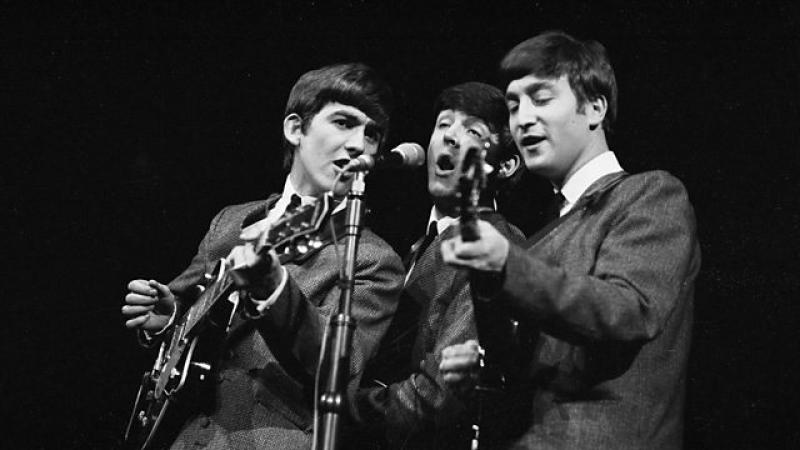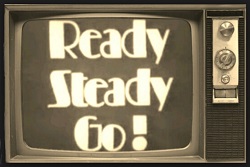The Story of Ready Steady Go!, BBC Four review - when life was fab | reviews, news & interviews
The Story of Ready Steady Go!, BBC Four review - when life was fab
The Story of Ready Steady Go!, BBC Four review - when life was fab
The show which started both the weekend and the whole concept of music television

It’s almost unbearably poignant, on this black Friday evening in March 2020, to watch a documentary about Ready Steady Go! , “the most innovative rock ‘n’ roll show ever”, believes Michael Lindsay-Hogg, the second of its four directors who went on to work with The Beatles and The Rolling Stones.
“The weekend starts here” was its (unofficial) slogan, though it wasn’t quoted in The Story of Ready Steady Go! Nor did its most famous presenter feature: everyone remembers Cathy McGowan, “the epitome of the mod girl”, as assistant producer Vicki Wickham put it, yet she was not interviewed – her choice, one assumes. Instead, Annie Nightingale (whom McGowan supposedly beat to the job) reminisced, along with a roster of talking heads that included Eric Burden, George Fame, Gerry Marsden and Melanie Coe, one of the show’s resident dancers, who recalled her star turn with the Beatles in March 1964. The show went out live at 6pm but work on it started at 8.30am so Melanie spent all day with Fab Four, presumably sagging off school. When she returned on Monday, all the girls wanted her autograph!
To have been a teenager in the 1960s was surely very heaven – the kids who came of age (which was then 21) in the early Sixties where the real baby-boomers. As Lindsay-Hogg noted, “birth control ushered in a new world which the rock ‘n’ rollers were writing about”. While for many “good girls”, that aspect of the Sixties didn’t happen until later in the decade, the music, and the “boys” who played it, showed them the possibilities of a new and very different life to the one their parents had lived. Mums and dads saw the show, specially with Mick Jagger, and felt deep anxiety.
 My sister was exactly the right age for the programme, rushing home Friday evenings from Harrods where she was a trainee buyer. As BBC 4’s rather wonderful documentary pointed out, families watched it while having their “tea”. My six- and seven-year-old ears somehow registered that some of the music was really good and I’ve always remembered McGowan, squinting out from her too-long fringe and oozing superlatives as she interviewed the musicians. Donovan has always stuck in my mind, “Catch the Wind” still a pleasing song. He made a brief appearance, sporting a grown-out wash ‘n’ wear perm. Oh dear…
My sister was exactly the right age for the programme, rushing home Friday evenings from Harrods where she was a trainee buyer. As BBC 4’s rather wonderful documentary pointed out, families watched it while having their “tea”. My six- and seven-year-old ears somehow registered that some of the music was really good and I’ve always remembered McGowan, squinting out from her too-long fringe and oozing superlatives as she interviewed the musicians. Donovan has always stuck in my mind, “Catch the Wind” still a pleasing song. He made a brief appearance, sporting a grown-out wash ‘n’ wear perm. Oh dear…
The idea for the programme, first broadcast in August 1963, came from Elkan Allan, and the show was relayed from Rediffusion’s Kingsway studios, a basement which was the home of Muriel Young and children’s television. The timing was perfect, for in November 1963 the Beatles played Sunday Night at the London Palladium (another Rediffusion show) and Beatlemania was born. Wickham was out of work and Allan took a chance on her, telling her to go out and “find” the Beatles. Keith Fordyce was the first presenter, “a lovely man but ancient”, in collar and tie, looking like a news reader. He is shown asking Dusty Springfield if she would like to become “a big star” or go on being “an amiable goon”. The latter she hoped, but she was also a massive star who had a major influence on RSG! and who of course left us too soon.
It was Dusty who pushed Wickham (later her manager) to feature black musicians on the show, introducing “suburban Britain” to R&B, as Jools Holland noted (he had to watch it on a neighbour’s television). Wickham was “the gatekeeper”, scouring the emergent club scene for talent, but Dusty would ring her from the US with suggestions. The Supremes got their big break on the show and Mary Wilson recalled Springfield as “a girl who spoke her mind and was very much into black culture”. She was the first person to be allowed to hear “Dancing in the Street”, Martha Reeves seeking her opinion.
Ready Steady Go! was “the Friday night scene”, as Wickham said, and perhaps it was right that it didn’t outstay its welcome. Though the artists all mimed until 1964, it was the first show to “go live”, Lindsay-Hogg ensuring the sound was the best it could then be. And not just the sound: when he heard the Stones’ “Paint it Black”, he told Jagger to think he was Lucifer – every time he raised his arm they’d take out a bank of studio lights until only Mick himself remained illuminated. Lindsay-Hogg thought him “an extraordinary kid” and compared him to Olivier!
McGowan was a key part of the show’s success, in large part because “she wasn’t terribly good at being a compere”. Rather she was just “an ordinary girl” but with “a Cleopatra look” who “always looked amazing” and “had the fashion nailed down”, wearing Mary Quant and Barbara Hulanicki - as much a face of the Sixties as Twiggy. The show’s influence on high street fashion deserves another documentary.
Oh happy day, to coin a phrase, an innocent and joyful time. The music was homegrown, a burgeoning of new talent, pop music not yet a capitalist creation with PRs and spin and a Praetorian Guard. In short it wasn’t all about money. Woodstock 1969 was when big business stepped in and spoiled it all.
As George Melly once said, RSG! "made pop music work on a truly national scale ... It was almost possible to feel a tremor of pubescent excitement from Land's End to John O'Groats". It was, said Lindsay-Hogg, all about “hedonism, pleasure, looking for a good time”.
For now, best remember those good old days.
Add comment
The future of Arts Journalism
You can stop theartsdesk.com closing!
We urgently need financing to survive. Our fundraising drive has thus far raised £49,000 but we need to reach £100,000 or we will be forced to close. Please contribute here: https://gofund.me/c3f6033d
And if you can forward this information to anyone who might assist, we’d be grateful.

Subscribe to theartsdesk.com
Thank you for continuing to read our work on theartsdesk.com. For unlimited access to every article in its entirety, including our archive of more than 15,000 pieces, we're asking for £5 per month or £40 per year. We feel it's a very good deal, and hope you do too.
To take a subscription now simply click here.
And if you're looking for that extra gift for a friend or family member, why not treat them to a theartsdesk.com gift subscription?
more TV
 The Monster of Florence, Netflix review - dramatisation of notorious Italian serial killer mystery
Director Stefano Sollima's four-parter makes gruelling viewing
The Monster of Florence, Netflix review - dramatisation of notorious Italian serial killer mystery
Director Stefano Sollima's four-parter makes gruelling viewing
 The Diplomat, Season 3, Netflix review - Ambassador Kate Wyler becomes America's Second Lady
Soapy transatlantic political drama keeps the Special Relationship alive
The Diplomat, Season 3, Netflix review - Ambassador Kate Wyler becomes America's Second Lady
Soapy transatlantic political drama keeps the Special Relationship alive
 The Perfect Neighbor, Netflix review - Florida found-footage documentary is a harrowing watch
Sundance winner chronicles a death that should have been prevented
The Perfect Neighbor, Netflix review - Florida found-footage documentary is a harrowing watch
Sundance winner chronicles a death that should have been prevented
 Murder Before Evensong, Acorn TV review - death comes to the picturesque village of Champton
The Rev Richard Coles's sleuthing cleric hits the screen
Murder Before Evensong, Acorn TV review - death comes to the picturesque village of Champton
The Rev Richard Coles's sleuthing cleric hits the screen
 Black Rabbit, Netflix review - grime and punishment in New York City
Jude Law and Jason Bateman tread the thin line between love and hate
Black Rabbit, Netflix review - grime and punishment in New York City
Jude Law and Jason Bateman tread the thin line between love and hate
 The Hack, ITV review - plodding anatomy of twin UK scandals
Jack Thorne's skill can't disguise the bagginess of his double-headed material
The Hack, ITV review - plodding anatomy of twin UK scandals
Jack Thorne's skill can't disguise the bagginess of his double-headed material
 Slow Horses, Series 5, Apple TV+ review - terror, trauma and impeccable comic timing
Jackson Lamb's band of MI5 misfits continues to fascinate and amuse
Slow Horses, Series 5, Apple TV+ review - terror, trauma and impeccable comic timing
Jackson Lamb's band of MI5 misfits continues to fascinate and amuse
 Coldwater, ITV1 review - horror and black comedy in the Highlands
Superb cast lights up David Ireland's cunning thriller
Coldwater, ITV1 review - horror and black comedy in the Highlands
Superb cast lights up David Ireland's cunning thriller
 Blu-ray: The Sweeney - Series One
Influential and entertaining 1970s police drama, handsomely restored
Blu-ray: The Sweeney - Series One
Influential and entertaining 1970s police drama, handsomely restored
 I Fought the Law, ITVX review - how an 800-year-old law was challenged and changed
Sheridan Smith's raw performance dominates ITV's new docudrama about injustice
I Fought the Law, ITVX review - how an 800-year-old law was challenged and changed
Sheridan Smith's raw performance dominates ITV's new docudrama about injustice
 The Paper, Sky Max review - a spinoff of the US Office worth waiting 20 years for
Perfectly judged recycling of the original's key elements, with a star turn at its heart
The Paper, Sky Max review - a spinoff of the US Office worth waiting 20 years for
Perfectly judged recycling of the original's key elements, with a star turn at its heart
 The Guest, BBC One review - be careful what you wish for
A terrific Eve Myles stars in addictive Welsh mystery
The Guest, BBC One review - be careful what you wish for
A terrific Eve Myles stars in addictive Welsh mystery

Comments
Mmmm.. Well I watched this
I did comment on McGowan's
I did comment on McGowan's absence, which was very odd, and the time - but perhaps not enough. I mentioned the slogan - which the programme didn't
I live in Leeds, and as far
Ah, well, of course it was on
It was on in the early
Did you know that Melanie Coe
No! Thank you.
No! Thank you.
I was lucky enough to dance
Excellent programme. When
Kevin Ward an alumni of Dame